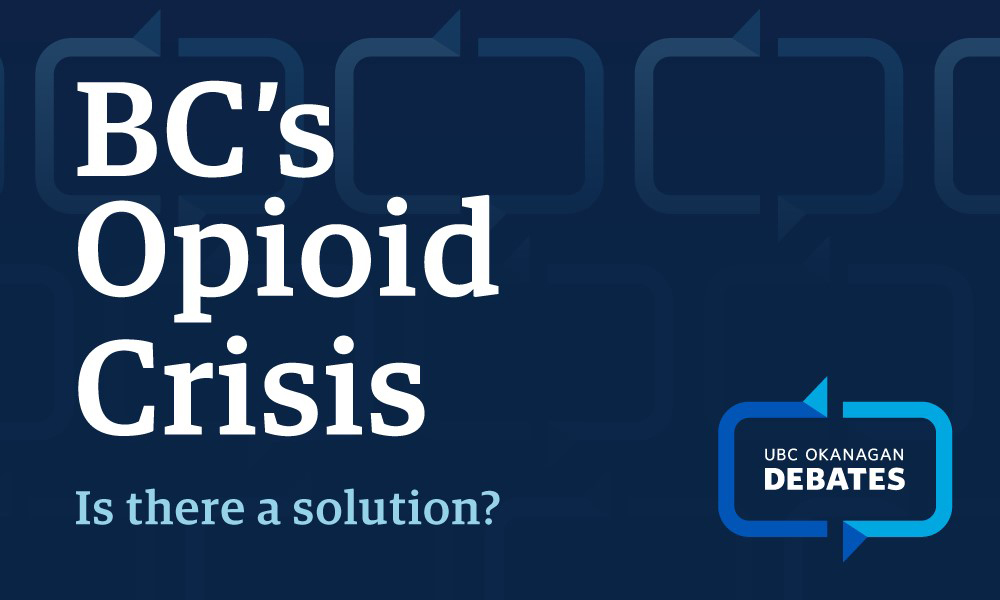
Everyone, it seems, has an opinion about the opioid crisis-whether it's through reading headlines, following social media, observing events in their community or their own lived experience.
But can anyone come up with a solution to a problem that has plagued British Columbia for more than eight years and claimed more than 14,000 lives? Declared a public health emergency in 2016 as opioid-related overdoses soared, the issue has since become a political hot potato, stacked with divisive views and misinformation.
Against the backdrop, BC has emerged as the epicentre of Canada's opioid crisis, with overdose death rates consistently among the highest in the country.
This is why UBC Okanagan Debates is tackling BC's opioid crisis as the next instalment taking place October 29 at the Kelowna Community Theatre. This debate will be different from previous ones, explains Marten Youssef, Associate Vice-President, University Relations at UBCO.
"We're taking a new approach to discuss this difficult and worrisome topic," says Youssef. "We have invited five leading experts in drug use, addiction, drug policy and public health to share their insights while they take the stage to discuss this complex and catastrophic issue. No winners. No losers. Just the cherished tradition of civil discourse."
Featured experts
Nolan Hop Wo: A member of the Métis Nation of Greater Victoria-and working with the Office of the Chief Medical Officer at the First Nations Health Authority as a psychiatrist-Dr. Hop Wo specializes in mental health and wellness and addictions. He also works as a clinical psychiatrist in both BC and Alberta.
Lisa Lapointe: BC's chief coroner from 2011 to 2024, Lapointe led the Coroners Service when it received the inaugural Premier's Award for Evidence-Based Design for its analysis and reporting of illicit drug toxicity deaths. She holds a law degree from UBC and is a former chair of the Canadian Forum of Chief Coroners and Chief Medical Examiners.
Eugenia Oviedo-Joekes: A professor at UBC's School of Population and Public Health, Dr. Oviedo-Joekes is the Canada Research Chair in Person-Centred Care in Addiction and Public Health. Her work focuses on diversifying treatments for opioid use disorder, including injectable opioid agonist treatment.
Tashia Petker: A doctoral student in clinical psychology at UBC Okanagan, Petker is an award-winning emerging scholar in substance use and addictions treatment. She is a published researcher in clinical neuroscience, behavioural economics and innovative treatment whose work aims to improve treatments for opioid use disorder, youth addictions and complex mental health issues.
Julian Somers: A clinical psychologist at Simon Fraser University, Dr. Somers is a specialist in harm reduction and recovery from addiction. Dr. Somers led multi-jurisdictional initiatives integrating primary care with mental health and addiction services and he directed randomized trials comparing recovery-oriented and congregate housing.
"The opioid crisis has affected everyone in BC in some way, either directly or indirectly. But years into this health emergency, we seem farther than ever from enduring solutions to the problem," says Dr. Lesley Cormack, Principal of UBC Okanagan. "As the region's go-to place for challenging conversations on disputed and timely topics, UBC Okanagan Debates is an excellent venue to explore solutions to the vexing challenge that is BC's opioid crisis."
UBC Okanagan Debates series hosts "BC's Opioid Crisis: Is there a solution?" on Tuesday, October 29, starting at 7 pm at the Kelowna Community Theatre, 1375 Water St.
While this event is free, pre-registration is required. For more details and to book tickets, visit: ok.ubc.ca/debates






